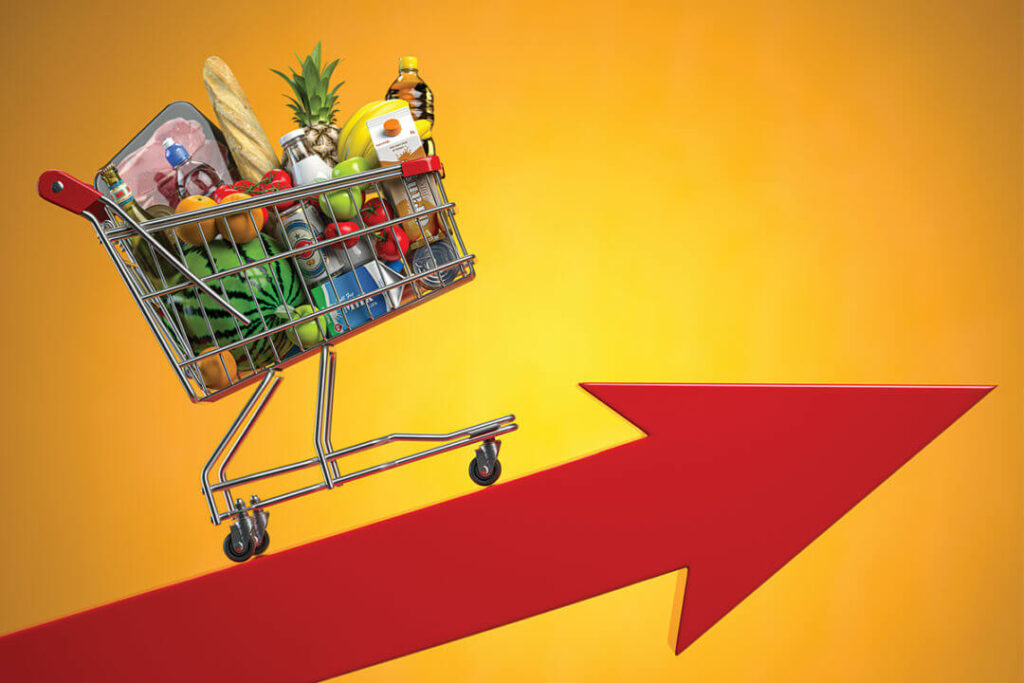Food Price Increases Drive Up UK Inflation To 10.1%
In September The Annual Inflation Rate Returns To Double Digits As Households Face Rising Living Costs Crisis
Inflation in the United Kingdom has surged beyond 10% for the second time this year, as people face the largest annual jump in food costs in more than 40 years amid the cost-of-living crisis.
The consumer price index increased to 10.1% in September, returning to double digits following a tiny fall to 9.9% in August, according to the Office for National Statistics (ONS). The last time it was higher was in 1982. City economists had anticipated a slightly lower growth of 10%.
Soaring food and beverage costs were the primary driver of the current cost of living increase, with an annual increase of about 15%, the fastest annual growth rate since April 1980, as the prices of bread and cereals, meat, milk, cheese, and eggs skyrocketed.
The September inflation rate is significant since it is used to adjust pensions and benefits for the following April. However, there have been reports that the new chancellor, Jeremy Hunt, may breach the Conservative party’s manifesto pledge to the ‘triple lock’, which guarantees that state pensions will rise each year in line with inflation, average wage growth, or 2.5%, whichever is greater.
If the traditional formula is implemented, payments will grow by the full 10.1%, amounting to slightly over £1,000 per year for someone receiving the full state pension.
The government is thought to be considering raising pensions and benefits in line with average wage growth of 5.5%, saving about £8bn next year for the exchequer, after Hunt said decisions of “eye-watering difficulty” were needed to balance the books after the failed mini-budget.
Choosing the more affordable model would be consistent with the austerity mantra that Jeremy Hunt has been preaching continuously since becoming chancellor five days ago.
According to the Resolution Foundation, a single disabled adult on universal credit would lose £380, a working single parent with one child £478, and a working couple with three children £978. This would cause real hardship for some of the least well-off people in the UK and would be certain to trigger a political backlash. Conservative MPs would be particularly aware of the risks of alienating pensioners, given that they overwhelmingly voted for Boris Johnson in the 2019 election.
Jack Leslie, a senior economist at the think tank, said: “While the significant Treasury savings may look tempting in the context of its attempts to fill its fiscal hole, the cost to 10 million working-age families and almost every pensioner would be huge.”
Furthermore, a breakdown of the latest inflation numbers from the Office for National Statistics shows that the largest annual price increases in 40 years are disproportionately affecting the poorest. Poorer households spend a larger proportion of their budget on food than wealthier households, and food costs have grown by more than 14% in the last year.
There is some tentative evidence that inflation, while projected to climb more in October due to increasing energy bills, may be nearing a peak. The yearly growth in motor fuels fell from 32.1% to 26.5% as global oil prices fell. Producer prices, which predict the prices that consumers will encounter in the next months, also fell marginally.
Less encouraging, annual core inflation – price increases for goods and services excluding fuel, food, alcohol, and cigarettes – increased from 6.3% to 6.5% in September.
The statistics come as homeowners face rising mortgage costs, rising Bank of England interest rates, and a dramatic spike in UK government bond prices sparked by last month’s mini-budget.
Despite the increased dangers of recession as rising living expenses drive families to cut down on spending, the central bank is likely to hike interest rates from the present level of 2.25% in an effort to reduce inflation.
ONS figures also show that electricity prices increased by 54% and gas prices increased by 95.7% in the year to September. Statisticians will examine how a reduction in the term of the government’s energy price guarantee might influence the headline rate of inflation and will make a statement on October 31 – the same day as Hunt’s debt-cutting proposal.
The Labour shadow chancellor, Rachel Reeves, claimed the new numbers proved the government had lost control of the economy in the midst of its own crisis. “It’s clear that the damage has been done. This is a Tory crisis, made in Downing Street and paid for by working people,” Reeves stated.
“The facts speak for themselves. Mortgage costs are soaring. Borrowing costs are up. Living standards down. And we are forecast to have the lowest growth in the G7 over the next two years.”
Online sources: theguardian.com
All opinions and views expressed or suggested by the Digital Zeitgeist are not necessarily the same opinions and views held by or suggested by GPM-Invest plus any and all partners, affiliates, parties, or third parties of GPM-Invest. Any type of media distributed by GPM-Invest IS NOT financial advice. Please seek advice from a professional financial advisor

